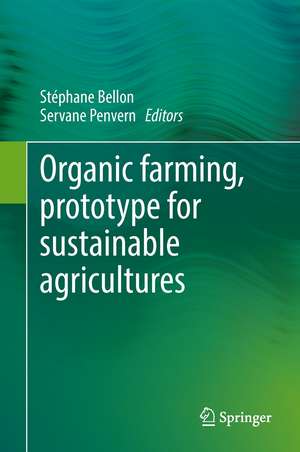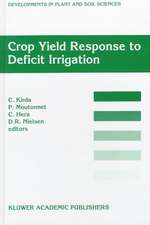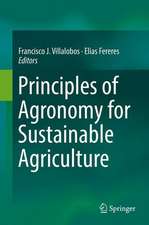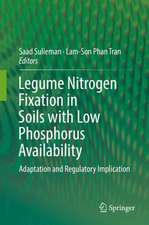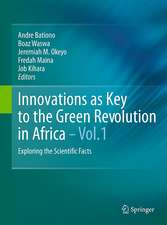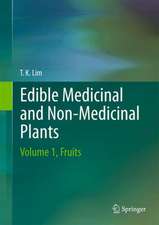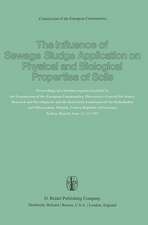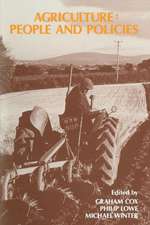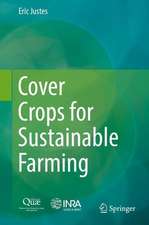Organic Farming, Prototype for Sustainable Agricultures
Editat de Stéphane Bellon, Servane Penvernen Limba Engleză Hardback – 8 mai 2014
| Toate formatele și edițiile | Preț | Express |
|---|---|---|
| Paperback (1) | 1390.11 lei 6-8 săpt. | |
| SPRINGER NETHERLANDS – 17 sep 2016 | 1390.11 lei 6-8 săpt. | |
| Hardback (1) | 1404.46 lei 6-8 săpt. | |
| SPRINGER NETHERLANDS – 8 mai 2014 | 1404.46 lei 6-8 săpt. |
Preț: 1404.46 lei
Preț vechi: 1712.76 lei
-18% Nou
Puncte Express: 2107
Preț estimativ în valută:
268.77€ • 291.85$ • 225.77£
268.77€ • 291.85$ • 225.77£
Carte tipărită la comandă
Livrare economică 23 aprilie-07 mai
Preluare comenzi: 021 569.72.76
Specificații
ISBN-13: 9789400779266
ISBN-10: 9400779267
Pagini: 489
Ilustrații: XVI, 489 p. 56 illus., 30 illus. in color.
Dimensiuni: 155 x 235 x 27 mm
Greutate: 1.12 kg
Ediția:2014
Editura: SPRINGER NETHERLANDS
Colecția Springer
Locul publicării:Dordrecht, Netherlands
ISBN-10: 9400779267
Pagini: 489
Ilustrații: XVI, 489 p. 56 illus., 30 illus. in color.
Dimensiuni: 155 x 235 x 27 mm
Greutate: 1.12 kg
Ediția:2014
Editura: SPRINGER NETHERLANDS
Colecția Springer
Locul publicării:Dordrecht, Netherlands
Public țintă
ResearchCuprins
Preface.- 1. Introduction: Organic food and Farming, Prototype for Sustainable Agriculture.- PART 1 – SYSTEM’S FUNCTIONING TO IMPROVE SELF-SUFFICIENCY.- 1.1 Organic Landcare and Fertility.- 2. Soil phosphorus (P) management in organic cropping systems: from current practices to avenues for a more efficient use of P resource.- 3. Intercropping – applying ecological principles for improved nitrogen use efficiency in organic farming systems.- 1.2 Crop Protection in Organic Farming.- 4. Regulatory framework for plant protection in organic farming.- 5. Conservation biocontrol: Principles and implementation in organic farming.- 6. Contribution of agroecology to plant protection in Organic Farming: Relevance and Limits.- 7. Building apple ideotypes adapted to organic and low-input, competitive systems.- 1.3 Livestock Management and System Design.- 8. Alternatives to chemical antiparasitic drugs in livestock in organic farming.- 9. Animal healthcare strategies in organic and conventional farming.- 10. Technical and economic performances in organic sheep-for-meat farms: observations on sheep-rearing networks and experimental farms.- 11. Experiencing organic mixed-crop dairy systems: a step by step assessment and redesign centred on a long-term experiment.- PART 2 – ORGANIC PERFORMANCES: BETWEEN SOCIETAL EXPECTATIONS AND SCIENTIFIC EVIDENCE.- 2.1 Environmental Issues.- 12. Using Life Cycle Analysis to compare the environmental performance of organic and conventional apple orchards.- 13. The potential of organic agriculture to mitigate the impact of agriculture on global warming - a review.- 2.2 Animal Welfare.- 14. The respect of the five freedoms of farm animal in a context of environmental and health constraints: how much organic farming may play a role? A review.- 15. Can organic animal farmers do animal husbandry? Breaking with “animal production”, a major issue for organic farming.- 2.3 Quality of OrganicProducts.- 16. Food quality and possible positive health effect of organic products.- 17. Quality of organic lamb.- 18. Is organic farming unsustainable? Analysis of the debate about the conventionalisation of the organic label.- PART 3 – DEVELOPMENT DYNAMIC AND UP-SCALING (FOOD SYSTEM AND TERRITORY).- 3.1 New Frameworks for New Valuation Criteria.- 19. Transforming Recognition of the Social, Ecological and Economic Goods and Services Derived from Organic Agriculture in the Canadian Context.- 20. Seed sector and breeding methods: challenges for organic varieties.- 21. Seed for Organic Agriculture: the Development of the Participatory Plant Breeding and the Farmers’ Networks in France.- 3.2 Transition Pathways in Agri-Food Systems: Farming Practices and Food Networks.- 22. Enabling the Ecological Redesign of Organic and Conventional Agriculture: A Social Ecology and Psychosocial Perspective – Position Paper.- 23. Transitions towards organic farming at the farm and at the local scales: the role of innovative production and organisational modes and networks.- 24. Contributing to the sustainability of agro-food systems: Potentials and pitfalls for organic farming.- 25. Multi-scale integrated assessment of regional conversion to Organic Farming.
Textul de pe ultima copertă
Various stakeholders have shown a growing interest in organic food and farming (OF&F), which has become a widespread issue at all levels of society. However, much debate still arises about the value of OF&F as a model for sustainable agriculture. Rather than questioning whether organic farming performs better or not than conventional farming, the main question addressed in this book is how and under what conditions OF&F may contribute to sustainable agricultures. Multiple forms are emerging today, among which OF&F represents a prototype, evolving in strong interaction with them and tackling the multiple challenges facing sustainable agriculture.
This book presents 25 papers divided into three main sections. The first section investigates OF&F production processes and the capacity of OF&F to benefit from ecological regulations and system functioning to achieve a greater degree of self-sufficiency. The second one proposes an overview of organic performances that provide commodities and public goods in response to societal demands. The third focuses on how to mainstream different forms of organic agriculture, including development pathways for organic farming and up-scaling within agri-food systems and territories.
In addition to a strong theoretical component, this book provides an overview of the current challenges facing OF&F. It questions the successes and limitations of organics, with particular emphasis on bottlenecks and lock-in effects at various levels, highlighting recent innovations and presenting a critical appraisal of the state of the art of existing knowledge. It contributes to our understanding of the perspectives and future challenges for research in organic farming in France and in Europe.
Each area of OF&F is examined, with papers from leading experts who have been involved in organic research projects and partnerships for many years and who provide complementary insights into the key issues facing organic agriculture and research worldwide.
This book presents 25 papers divided into three main sections. The first section investigates OF&F production processes and the capacity of OF&F to benefit from ecological regulations and system functioning to achieve a greater degree of self-sufficiency. The second one proposes an overview of organic performances that provide commodities and public goods in response to societal demands. The third focuses on how to mainstream different forms of organic agriculture, including development pathways for organic farming and up-scaling within agri-food systems and territories.
In addition to a strong theoretical component, this book provides an overview of the current challenges facing OF&F. It questions the successes and limitations of organics, with particular emphasis on bottlenecks and lock-in effects at various levels, highlighting recent innovations and presenting a critical appraisal of the state of the art of existing knowledge. It contributes to our understanding of the perspectives and future challenges for research in organic farming in France and in Europe.
Each area of OF&F is examined, with papers from leading experts who have been involved in organic research projects and partnerships for many years and who provide complementary insights into the key issues facing organic agriculture and research worldwide.
Caracteristici
Qualified authors involved in organic research (projects), from various disciplines and countries Wide range of topics addressed, relevant for the development of organic and sustainable agricultures Updated results and references, thematic index
